Corporate Governance Analysis: Volkswagen Emission Scandal, Semester 2
VerifiedAdded on 2022/11/25
|10
|2983
|446
Report
AI Summary
This report provides a comprehensive analysis of the Volkswagen emission scandal, examining the ethical issues and corporate governance failures. It begins with an introduction to the scandal, outlining the key issues and the company's actions. The report then delves into a critical analysis of the ethical dimensions, applying conventional ethical theories such as utilitarianism, deontological ethics, and virtue theory, alongside an Islamic ethical perspective. Furthermore, the report evaluates the effectiveness of Volkswagen's corporate governance structure, comparing it to similar corporations and suggesting improvements. The analysis considers aspects of accountability, independence, leadership, and competence. The report concludes with recommendations for enhancing Volkswagen's governance to prevent future ethical breaches, offering insights into the importance of ethical leadership and robust governance frameworks within multinational corporations.
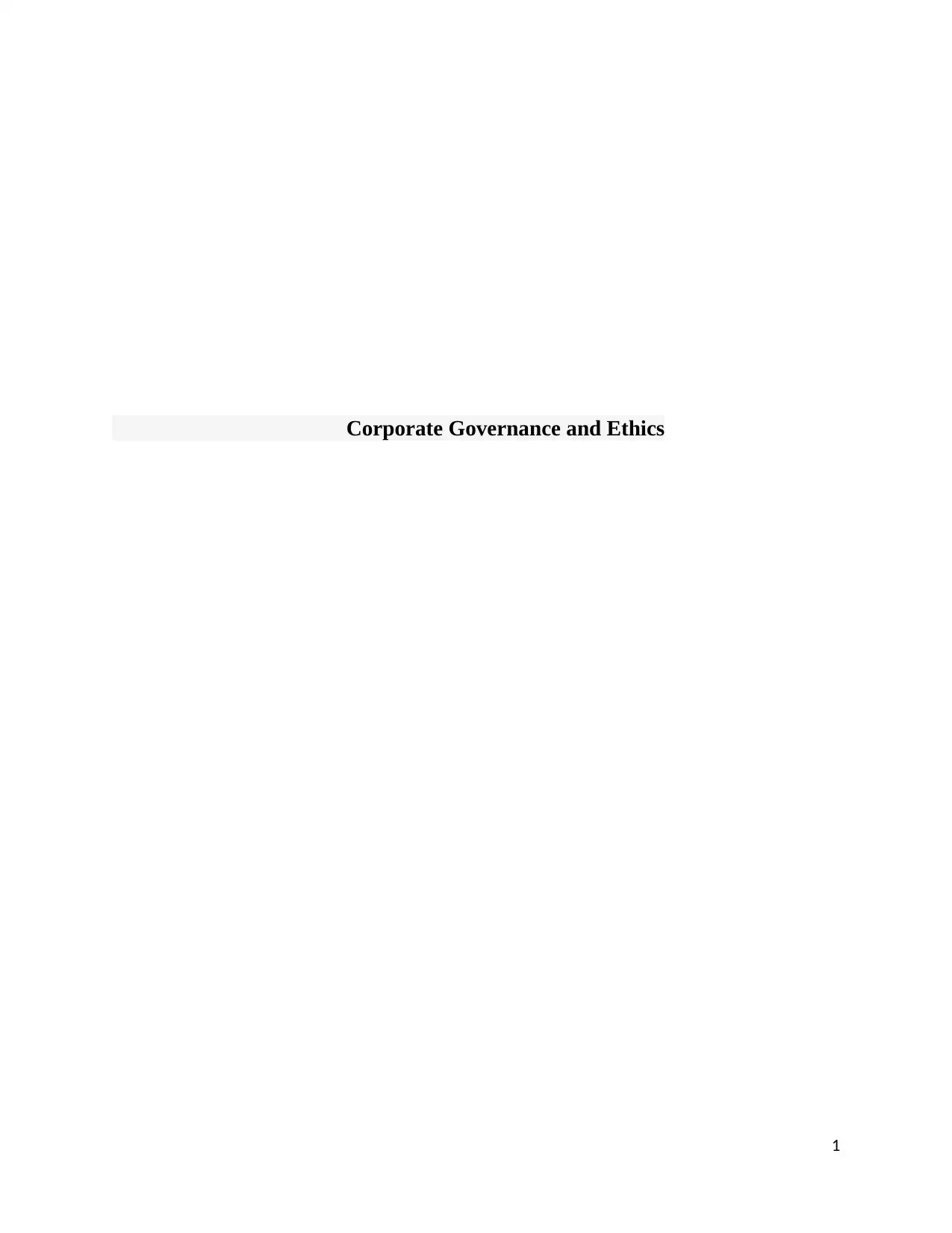
Corporate Governance and Ethics
1
1
Paraphrase This Document
Need a fresh take? Get an instant paraphrase of this document with our AI Paraphraser
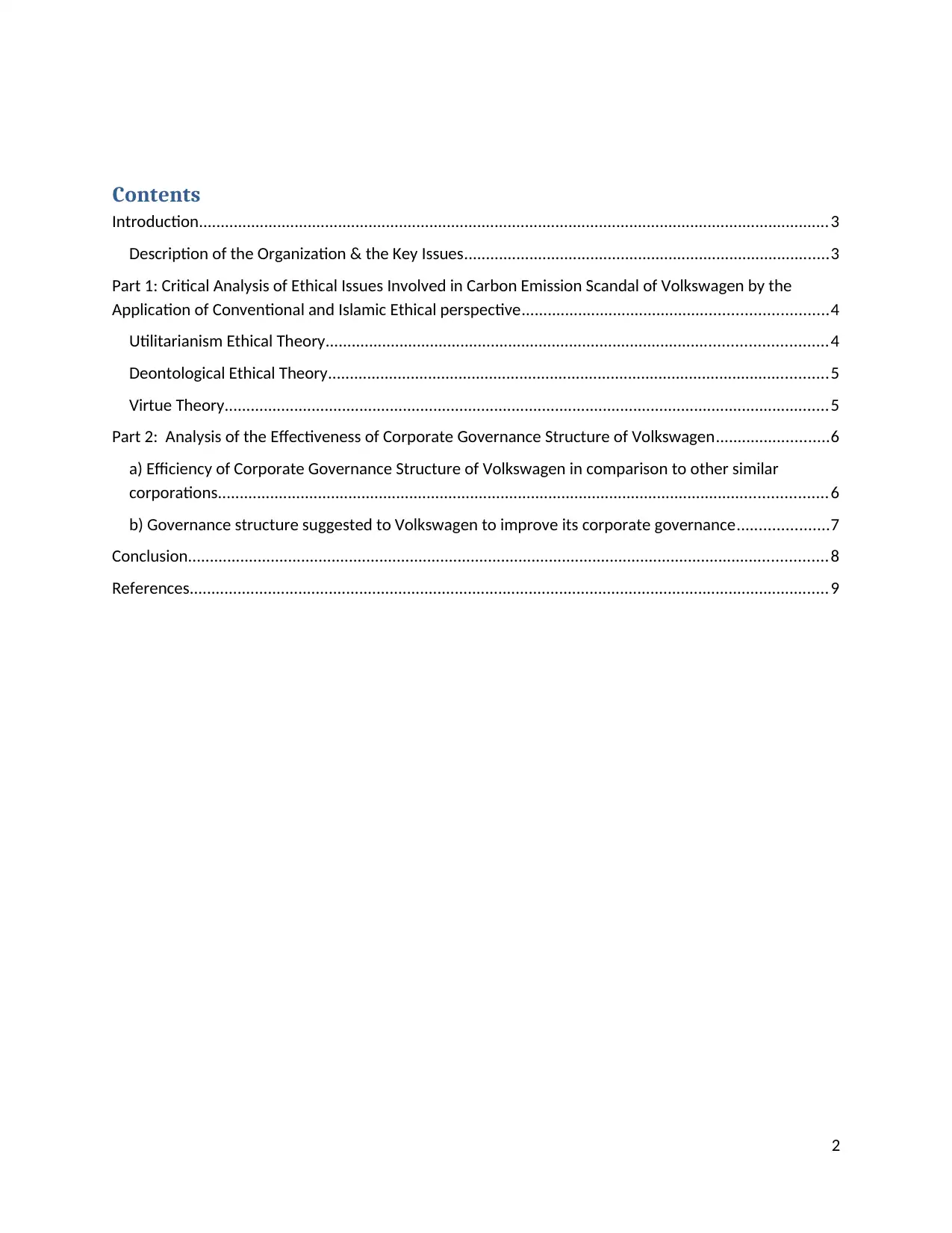
Contents
Introduction.................................................................................................................................................3
Description of the Organization & the Key Issues....................................................................................3
Part 1: Critical Analysis of Ethical Issues Involved in Carbon Emission Scandal of Volkswagen by the
Application of Conventional and Islamic Ethical perspective......................................................................4
Utilitarianism Ethical Theory...................................................................................................................4
Deontological Ethical Theory...................................................................................................................5
Virtue Theory...........................................................................................................................................5
Part 2: Analysis of the Effectiveness of Corporate Governance Structure of Volkswagen..........................6
a) Efficiency of Corporate Governance Structure of Volkswagen in comparison to other similar
corporations............................................................................................................................................6
b) Governance structure suggested to Volkswagen to improve its corporate governance.....................7
Conclusion...................................................................................................................................................8
References...................................................................................................................................................9
2
Introduction.................................................................................................................................................3
Description of the Organization & the Key Issues....................................................................................3
Part 1: Critical Analysis of Ethical Issues Involved in Carbon Emission Scandal of Volkswagen by the
Application of Conventional and Islamic Ethical perspective......................................................................4
Utilitarianism Ethical Theory...................................................................................................................4
Deontological Ethical Theory...................................................................................................................5
Virtue Theory...........................................................................................................................................5
Part 2: Analysis of the Effectiveness of Corporate Governance Structure of Volkswagen..........................6
a) Efficiency of Corporate Governance Structure of Volkswagen in comparison to other similar
corporations............................................................................................................................................6
b) Governance structure suggested to Volkswagen to improve its corporate governance.....................7
Conclusion...................................................................................................................................................8
References...................................................................................................................................................9
2
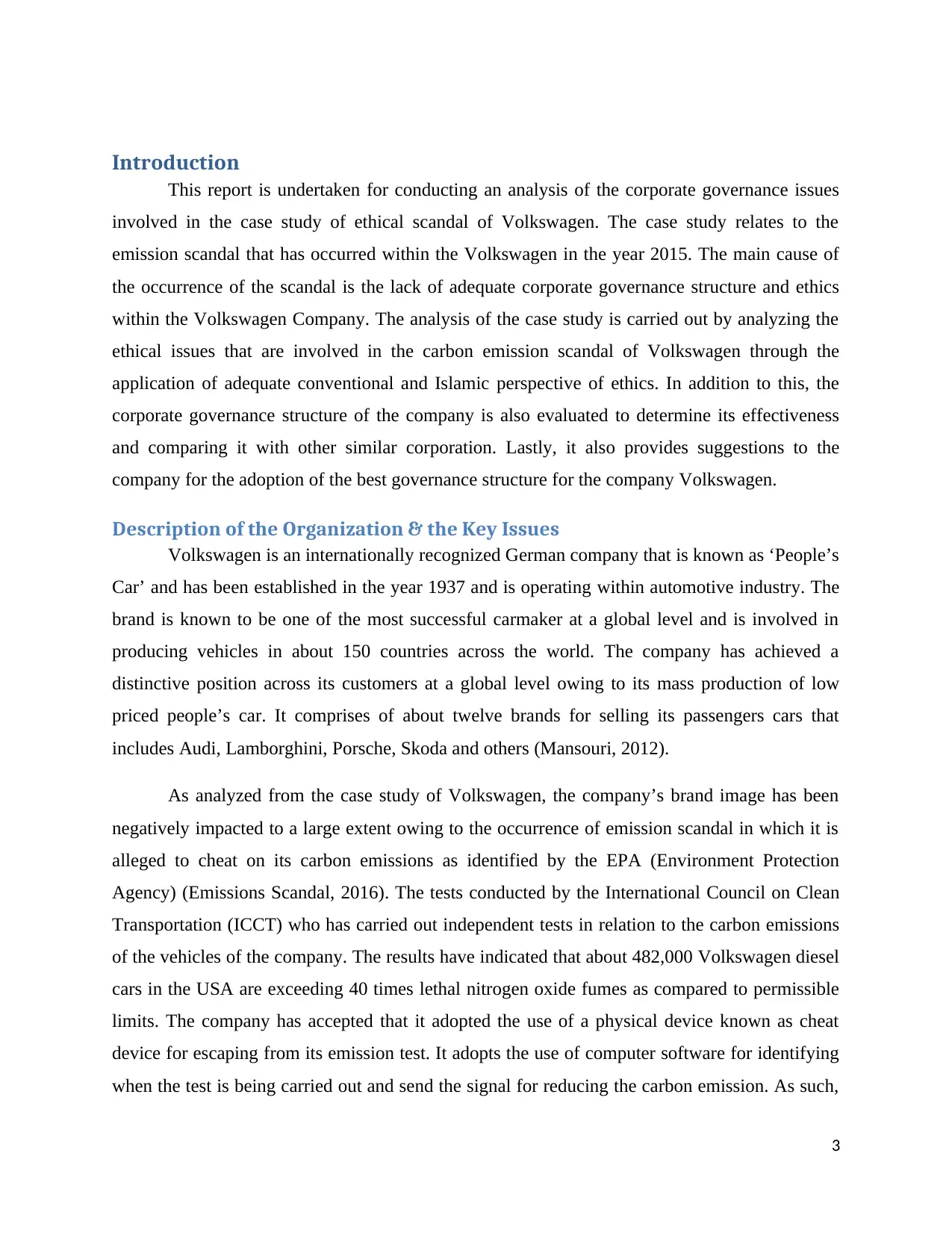
Introduction
This report is undertaken for conducting an analysis of the corporate governance issues
involved in the case study of ethical scandal of Volkswagen. The case study relates to the
emission scandal that has occurred within the Volkswagen in the year 2015. The main cause of
the occurrence of the scandal is the lack of adequate corporate governance structure and ethics
within the Volkswagen Company. The analysis of the case study is carried out by analyzing the
ethical issues that are involved in the carbon emission scandal of Volkswagen through the
application of adequate conventional and Islamic perspective of ethics. In addition to this, the
corporate governance structure of the company is also evaluated to determine its effectiveness
and comparing it with other similar corporation. Lastly, it also provides suggestions to the
company for the adoption of the best governance structure for the company Volkswagen.
Description of the Organization & the Key Issues
Volkswagen is an internationally recognized German company that is known as ‘People’s
Car’ and has been established in the year 1937 and is operating within automotive industry. The
brand is known to be one of the most successful carmaker at a global level and is involved in
producing vehicles in about 150 countries across the world. The company has achieved a
distinctive position across its customers at a global level owing to its mass production of low
priced people’s car. It comprises of about twelve brands for selling its passengers cars that
includes Audi, Lamborghini, Porsche, Skoda and others (Mansouri, 2012).
As analyzed from the case study of Volkswagen, the company’s brand image has been
negatively impacted to a large extent owing to the occurrence of emission scandal in which it is
alleged to cheat on its carbon emissions as identified by the EPA (Environment Protection
Agency) (Emissions Scandal, 2016). The tests conducted by the International Council on Clean
Transportation (ICCT) who has carried out independent tests in relation to the carbon emissions
of the vehicles of the company. The results have indicated that about 482,000 Volkswagen diesel
cars in the USA are exceeding 40 times lethal nitrogen oxide fumes as compared to permissible
limits. The company has accepted that it adopted the use of a physical device known as cheat
device for escaping from its emission test. It adopts the use of computer software for identifying
when the test is being carried out and send the signal for reducing the carbon emission. As such,
3
This report is undertaken for conducting an analysis of the corporate governance issues
involved in the case study of ethical scandal of Volkswagen. The case study relates to the
emission scandal that has occurred within the Volkswagen in the year 2015. The main cause of
the occurrence of the scandal is the lack of adequate corporate governance structure and ethics
within the Volkswagen Company. The analysis of the case study is carried out by analyzing the
ethical issues that are involved in the carbon emission scandal of Volkswagen through the
application of adequate conventional and Islamic perspective of ethics. In addition to this, the
corporate governance structure of the company is also evaluated to determine its effectiveness
and comparing it with other similar corporation. Lastly, it also provides suggestions to the
company for the adoption of the best governance structure for the company Volkswagen.
Description of the Organization & the Key Issues
Volkswagen is an internationally recognized German company that is known as ‘People’s
Car’ and has been established in the year 1937 and is operating within automotive industry. The
brand is known to be one of the most successful carmaker at a global level and is involved in
producing vehicles in about 150 countries across the world. The company has achieved a
distinctive position across its customers at a global level owing to its mass production of low
priced people’s car. It comprises of about twelve brands for selling its passengers cars that
includes Audi, Lamborghini, Porsche, Skoda and others (Mansouri, 2012).
As analyzed from the case study of Volkswagen, the company’s brand image has been
negatively impacted to a large extent owing to the occurrence of emission scandal in which it is
alleged to cheat on its carbon emissions as identified by the EPA (Environment Protection
Agency) (Emissions Scandal, 2016). The tests conducted by the International Council on Clean
Transportation (ICCT) who has carried out independent tests in relation to the carbon emissions
of the vehicles of the company. The results have indicated that about 482,000 Volkswagen diesel
cars in the USA are exceeding 40 times lethal nitrogen oxide fumes as compared to permissible
limits. The company has accepted that it adopted the use of a physical device known as cheat
device for escaping from its emission test. It adopts the use of computer software for identifying
when the test is being carried out and send the signal for reducing the carbon emission. As such,
3
⊘ This is a preview!⊘
Do you want full access?
Subscribe today to unlock all pages.

Trusted by 1+ million students worldwide
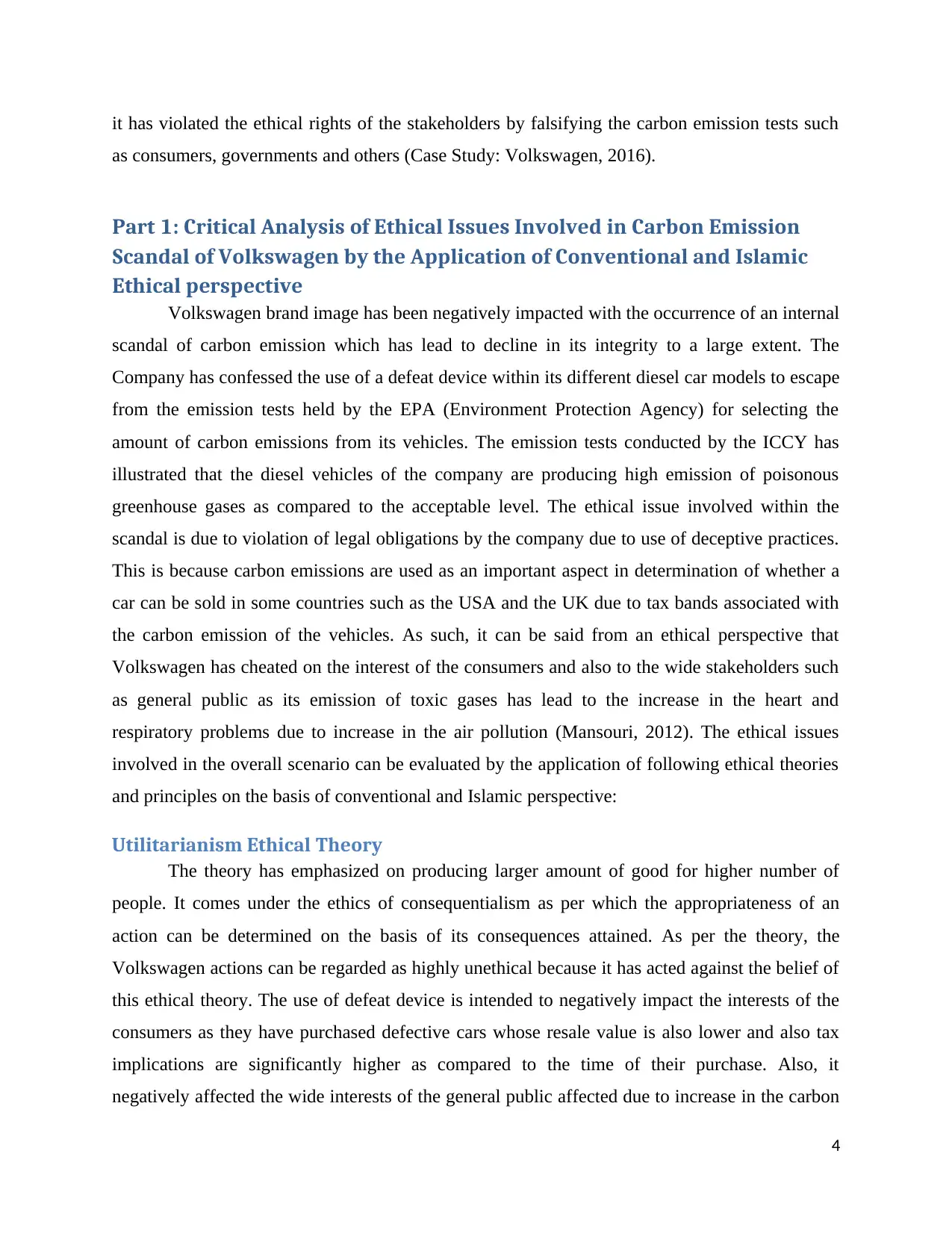
it has violated the ethical rights of the stakeholders by falsifying the carbon emission tests such
as consumers, governments and others (Case Study: Volkswagen, 2016).
Part 1: Critical Analysis of Ethical Issues Involved in Carbon Emission
Scandal of Volkswagen by the Application of Conventional and Islamic
Ethical perspective
Volkswagen brand image has been negatively impacted with the occurrence of an internal
scandal of carbon emission which has lead to decline in its integrity to a large extent. The
Company has confessed the use of a defeat device within its different diesel car models to escape
from the emission tests held by the EPA (Environment Protection Agency) for selecting the
amount of carbon emissions from its vehicles. The emission tests conducted by the ICCY has
illustrated that the diesel vehicles of the company are producing high emission of poisonous
greenhouse gases as compared to the acceptable level. The ethical issue involved within the
scandal is due to violation of legal obligations by the company due to use of deceptive practices.
This is because carbon emissions are used as an important aspect in determination of whether a
car can be sold in some countries such as the USA and the UK due to tax bands associated with
the carbon emission of the vehicles. As such, it can be said from an ethical perspective that
Volkswagen has cheated on the interest of the consumers and also to the wide stakeholders such
as general public as its emission of toxic gases has lead to the increase in the heart and
respiratory problems due to increase in the air pollution (Mansouri, 2012). The ethical issues
involved in the overall scenario can be evaluated by the application of following ethical theories
and principles on the basis of conventional and Islamic perspective:
Utilitarianism Ethical Theory
The theory has emphasized on producing larger amount of good for higher number of
people. It comes under the ethics of consequentialism as per which the appropriateness of an
action can be determined on the basis of its consequences attained. As per the theory, the
Volkswagen actions can be regarded as highly unethical because it has acted against the belief of
this ethical theory. The use of defeat device is intended to negatively impact the interests of the
consumers as they have purchased defective cars whose resale value is also lower and also tax
implications are significantly higher as compared to the time of their purchase. Also, it
negatively affected the wide interests of the general public affected due to increase in the carbon
4
as consumers, governments and others (Case Study: Volkswagen, 2016).
Part 1: Critical Analysis of Ethical Issues Involved in Carbon Emission
Scandal of Volkswagen by the Application of Conventional and Islamic
Ethical perspective
Volkswagen brand image has been negatively impacted with the occurrence of an internal
scandal of carbon emission which has lead to decline in its integrity to a large extent. The
Company has confessed the use of a defeat device within its different diesel car models to escape
from the emission tests held by the EPA (Environment Protection Agency) for selecting the
amount of carbon emissions from its vehicles. The emission tests conducted by the ICCY has
illustrated that the diesel vehicles of the company are producing high emission of poisonous
greenhouse gases as compared to the acceptable level. The ethical issue involved within the
scandal is due to violation of legal obligations by the company due to use of deceptive practices.
This is because carbon emissions are used as an important aspect in determination of whether a
car can be sold in some countries such as the USA and the UK due to tax bands associated with
the carbon emission of the vehicles. As such, it can be said from an ethical perspective that
Volkswagen has cheated on the interest of the consumers and also to the wide stakeholders such
as general public as its emission of toxic gases has lead to the increase in the heart and
respiratory problems due to increase in the air pollution (Mansouri, 2012). The ethical issues
involved in the overall scenario can be evaluated by the application of following ethical theories
and principles on the basis of conventional and Islamic perspective:
Utilitarianism Ethical Theory
The theory has emphasized on producing larger amount of good for higher number of
people. It comes under the ethics of consequentialism as per which the appropriateness of an
action can be determined on the basis of its consequences attained. As per the theory, the
Volkswagen actions can be regarded as highly unethical because it has acted against the belief of
this ethical theory. The use of defeat device is intended to negatively impact the interests of the
consumers as they have purchased defective cars whose resale value is also lower and also tax
implications are significantly higher as compared to the time of their purchase. Also, it
negatively affected the wide interests of the general public affected due to increase in the carbon
4
Paraphrase This Document
Need a fresh take? Get an instant paraphrase of this document with our AI Paraphraser
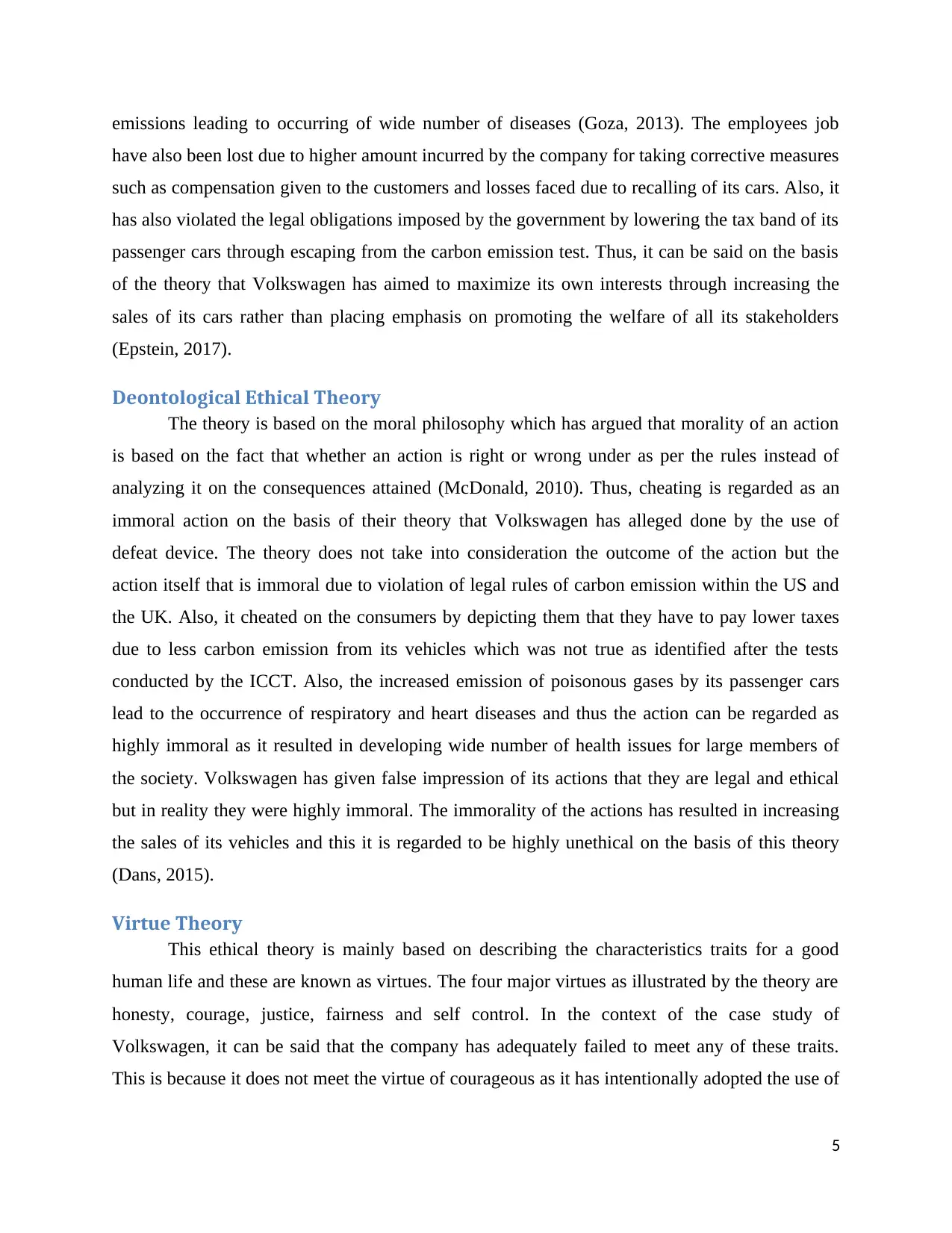
emissions leading to occurring of wide number of diseases (Goza, 2013). The employees job
have also been lost due to higher amount incurred by the company for taking corrective measures
such as compensation given to the customers and losses faced due to recalling of its cars. Also, it
has also violated the legal obligations imposed by the government by lowering the tax band of its
passenger cars through escaping from the carbon emission test. Thus, it can be said on the basis
of the theory that Volkswagen has aimed to maximize its own interests through increasing the
sales of its cars rather than placing emphasis on promoting the welfare of all its stakeholders
(Epstein, 2017).
Deontological Ethical Theory
The theory is based on the moral philosophy which has argued that morality of an action
is based on the fact that whether an action is right or wrong under as per the rules instead of
analyzing it on the consequences attained (McDonald, 2010). Thus, cheating is regarded as an
immoral action on the basis of their theory that Volkswagen has alleged done by the use of
defeat device. The theory does not take into consideration the outcome of the action but the
action itself that is immoral due to violation of legal rules of carbon emission within the US and
the UK. Also, it cheated on the consumers by depicting them that they have to pay lower taxes
due to less carbon emission from its vehicles which was not true as identified after the tests
conducted by the ICCT. Also, the increased emission of poisonous gases by its passenger cars
lead to the occurrence of respiratory and heart diseases and thus the action can be regarded as
highly immoral as it resulted in developing wide number of health issues for large members of
the society. Volkswagen has given false impression of its actions that they are legal and ethical
but in reality they were highly immoral. The immorality of the actions has resulted in increasing
the sales of its vehicles and this it is regarded to be highly unethical on the basis of this theory
(Dans, 2015).
Virtue Theory
This ethical theory is mainly based on describing the characteristics traits for a good
human life and these are known as virtues. The four major virtues as illustrated by the theory are
honesty, courage, justice, fairness and self control. In the context of the case study of
Volkswagen, it can be said that the company has adequately failed to meet any of these traits.
This is because it does not meet the virtue of courageous as it has intentionally adopted the use of
5
have also been lost due to higher amount incurred by the company for taking corrective measures
such as compensation given to the customers and losses faced due to recalling of its cars. Also, it
has also violated the legal obligations imposed by the government by lowering the tax band of its
passenger cars through escaping from the carbon emission test. Thus, it can be said on the basis
of the theory that Volkswagen has aimed to maximize its own interests through increasing the
sales of its cars rather than placing emphasis on promoting the welfare of all its stakeholders
(Epstein, 2017).
Deontological Ethical Theory
The theory is based on the moral philosophy which has argued that morality of an action
is based on the fact that whether an action is right or wrong under as per the rules instead of
analyzing it on the consequences attained (McDonald, 2010). Thus, cheating is regarded as an
immoral action on the basis of their theory that Volkswagen has alleged done by the use of
defeat device. The theory does not take into consideration the outcome of the action but the
action itself that is immoral due to violation of legal rules of carbon emission within the US and
the UK. Also, it cheated on the consumers by depicting them that they have to pay lower taxes
due to less carbon emission from its vehicles which was not true as identified after the tests
conducted by the ICCT. Also, the increased emission of poisonous gases by its passenger cars
lead to the occurrence of respiratory and heart diseases and thus the action can be regarded as
highly immoral as it resulted in developing wide number of health issues for large members of
the society. Volkswagen has given false impression of its actions that they are legal and ethical
but in reality they were highly immoral. The immorality of the actions has resulted in increasing
the sales of its vehicles and this it is regarded to be highly unethical on the basis of this theory
(Dans, 2015).
Virtue Theory
This ethical theory is mainly based on describing the characteristics traits for a good
human life and these are known as virtues. The four major virtues as illustrated by the theory are
honesty, courage, justice, fairness and self control. In the context of the case study of
Volkswagen, it can be said that the company has adequately failed to meet any of these traits.
This is because it does not meet the virtue of courageous as it has intentionally adopted the use of
5
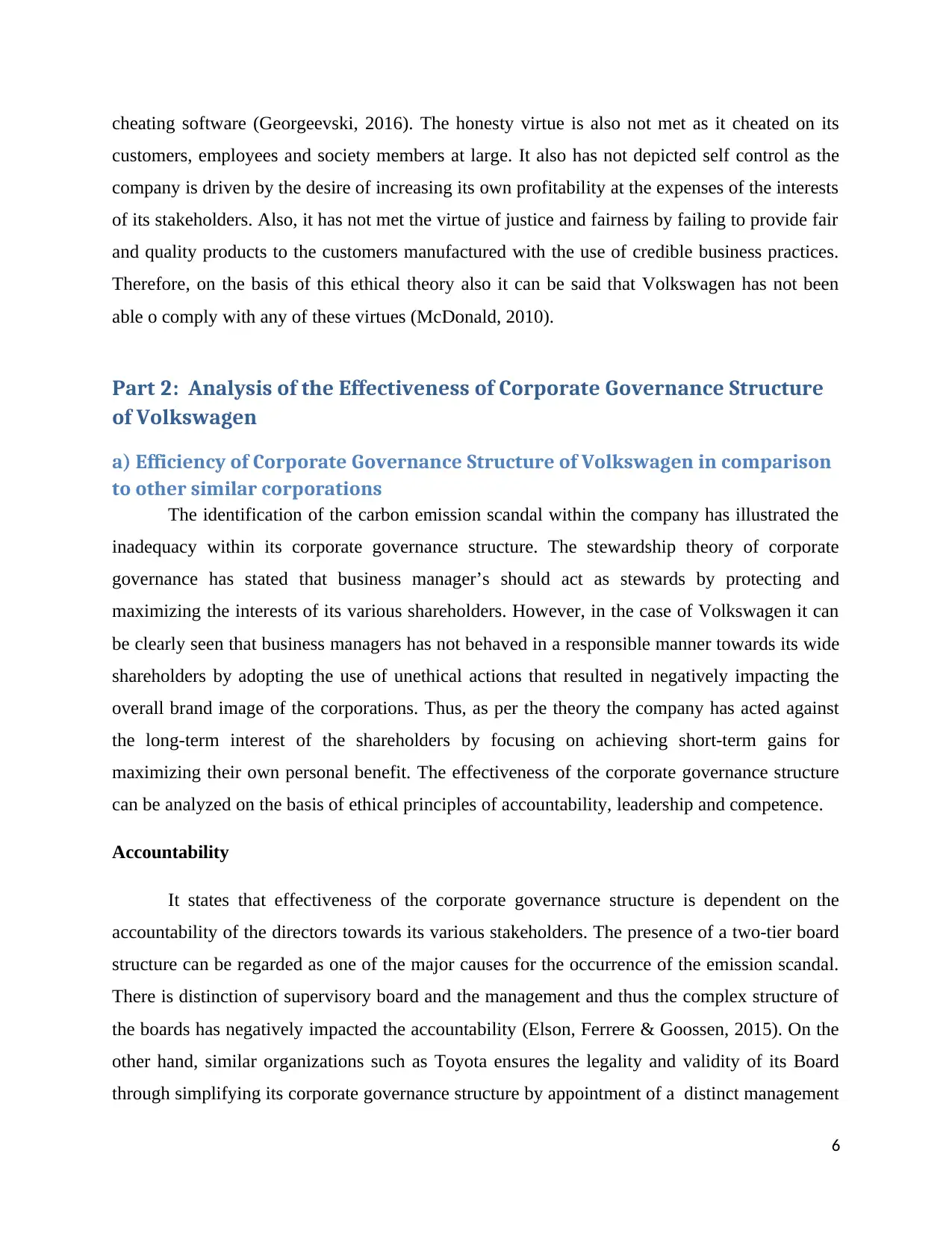
cheating software (Georgeevski, 2016). The honesty virtue is also not met as it cheated on its
customers, employees and society members at large. It also has not depicted self control as the
company is driven by the desire of increasing its own profitability at the expenses of the interests
of its stakeholders. Also, it has not met the virtue of justice and fairness by failing to provide fair
and quality products to the customers manufactured with the use of credible business practices.
Therefore, on the basis of this ethical theory also it can be said that Volkswagen has not been
able o comply with any of these virtues (McDonald, 2010).
Part 2: Analysis of the Effectiveness of Corporate Governance Structure
of Volkswagen
a) Efficiency of Corporate Governance Structure of Volkswagen in comparison
to other similar corporations
The identification of the carbon emission scandal within the company has illustrated the
inadequacy within its corporate governance structure. The stewardship theory of corporate
governance has stated that business manager’s should act as stewards by protecting and
maximizing the interests of its various shareholders. However, in the case of Volkswagen it can
be clearly seen that business managers has not behaved in a responsible manner towards its wide
shareholders by adopting the use of unethical actions that resulted in negatively impacting the
overall brand image of the corporations. Thus, as per the theory the company has acted against
the long-term interest of the shareholders by focusing on achieving short-term gains for
maximizing their own personal benefit. The effectiveness of the corporate governance structure
can be analyzed on the basis of ethical principles of accountability, leadership and competence.
Accountability
It states that effectiveness of the corporate governance structure is dependent on the
accountability of the directors towards its various stakeholders. The presence of a two-tier board
structure can be regarded as one of the major causes for the occurrence of the emission scandal.
There is distinction of supervisory board and the management and thus the complex structure of
the boards has negatively impacted the accountability (Elson, Ferrere & Goossen, 2015). On the
other hand, similar organizations such as Toyota ensures the legality and validity of its Board
through simplifying its corporate governance structure by appointment of a distinct management
6
customers, employees and society members at large. It also has not depicted self control as the
company is driven by the desire of increasing its own profitability at the expenses of the interests
of its stakeholders. Also, it has not met the virtue of justice and fairness by failing to provide fair
and quality products to the customers manufactured with the use of credible business practices.
Therefore, on the basis of this ethical theory also it can be said that Volkswagen has not been
able o comply with any of these virtues (McDonald, 2010).
Part 2: Analysis of the Effectiveness of Corporate Governance Structure
of Volkswagen
a) Efficiency of Corporate Governance Structure of Volkswagen in comparison
to other similar corporations
The identification of the carbon emission scandal within the company has illustrated the
inadequacy within its corporate governance structure. The stewardship theory of corporate
governance has stated that business manager’s should act as stewards by protecting and
maximizing the interests of its various shareholders. However, in the case of Volkswagen it can
be clearly seen that business managers has not behaved in a responsible manner towards its wide
shareholders by adopting the use of unethical actions that resulted in negatively impacting the
overall brand image of the corporations. Thus, as per the theory the company has acted against
the long-term interest of the shareholders by focusing on achieving short-term gains for
maximizing their own personal benefit. The effectiveness of the corporate governance structure
can be analyzed on the basis of ethical principles of accountability, leadership and competence.
Accountability
It states that effectiveness of the corporate governance structure is dependent on the
accountability of the directors towards its various stakeholders. The presence of a two-tier board
structure can be regarded as one of the major causes for the occurrence of the emission scandal.
There is distinction of supervisory board and the management and thus the complex structure of
the boards has negatively impacted the accountability (Elson, Ferrere & Goossen, 2015). On the
other hand, similar organizations such as Toyota ensures the legality and validity of its Board
through simplifying its corporate governance structure by appointment of a distinct management
6
⊘ This is a preview!⊘
Do you want full access?
Subscribe today to unlock all pages.

Trusted by 1+ million students worldwide
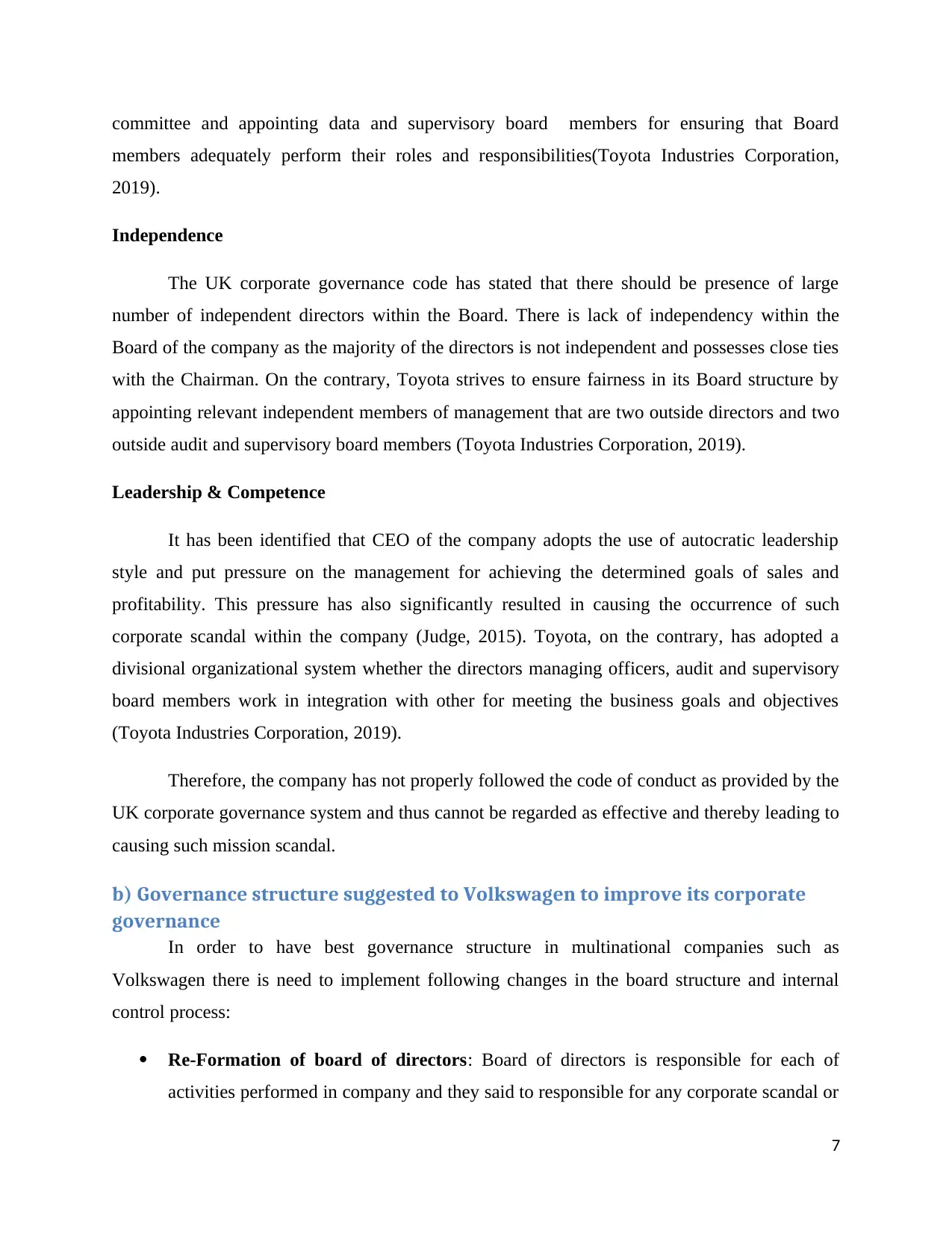
committee and appointing data and supervisory board members for ensuring that Board
members adequately perform their roles and responsibilities(Toyota Industries Corporation,
2019).
Independence
The UK corporate governance code has stated that there should be presence of large
number of independent directors within the Board. There is lack of independency within the
Board of the company as the majority of the directors is not independent and possesses close ties
with the Chairman. On the contrary, Toyota strives to ensure fairness in its Board structure by
appointing relevant independent members of management that are two outside directors and two
outside audit and supervisory board members (Toyota Industries Corporation, 2019).
Leadership & Competence
It has been identified that CEO of the company adopts the use of autocratic leadership
style and put pressure on the management for achieving the determined goals of sales and
profitability. This pressure has also significantly resulted in causing the occurrence of such
corporate scandal within the company (Judge, 2015). Toyota, on the contrary, has adopted a
divisional organizational system whether the directors managing officers, audit and supervisory
board members work in integration with other for meeting the business goals and objectives
(Toyota Industries Corporation, 2019).
Therefore, the company has not properly followed the code of conduct as provided by the
UK corporate governance system and thus cannot be regarded as effective and thereby leading to
causing such mission scandal.
b) Governance structure suggested to Volkswagen to improve its corporate
governance
In order to have best governance structure in multinational companies such as
Volkswagen there is need to implement following changes in the board structure and internal
control process:
Re-Formation of board of directors: Board of directors is responsible for each of
activities performed in company and they said to responsible for any corporate scandal or
7
members adequately perform their roles and responsibilities(Toyota Industries Corporation,
2019).
Independence
The UK corporate governance code has stated that there should be presence of large
number of independent directors within the Board. There is lack of independency within the
Board of the company as the majority of the directors is not independent and possesses close ties
with the Chairman. On the contrary, Toyota strives to ensure fairness in its Board structure by
appointing relevant independent members of management that are two outside directors and two
outside audit and supervisory board members (Toyota Industries Corporation, 2019).
Leadership & Competence
It has been identified that CEO of the company adopts the use of autocratic leadership
style and put pressure on the management for achieving the determined goals of sales and
profitability. This pressure has also significantly resulted in causing the occurrence of such
corporate scandal within the company (Judge, 2015). Toyota, on the contrary, has adopted a
divisional organizational system whether the directors managing officers, audit and supervisory
board members work in integration with other for meeting the business goals and objectives
(Toyota Industries Corporation, 2019).
Therefore, the company has not properly followed the code of conduct as provided by the
UK corporate governance system and thus cannot be regarded as effective and thereby leading to
causing such mission scandal.
b) Governance structure suggested to Volkswagen to improve its corporate
governance
In order to have best governance structure in multinational companies such as
Volkswagen there is need to implement following changes in the board structure and internal
control process:
Re-Formation of board of directors: Board of directors is responsible for each of
activities performed in company and they said to responsible for any corporate scandal or
7
Paraphrase This Document
Need a fresh take? Get an instant paraphrase of this document with our AI Paraphraser
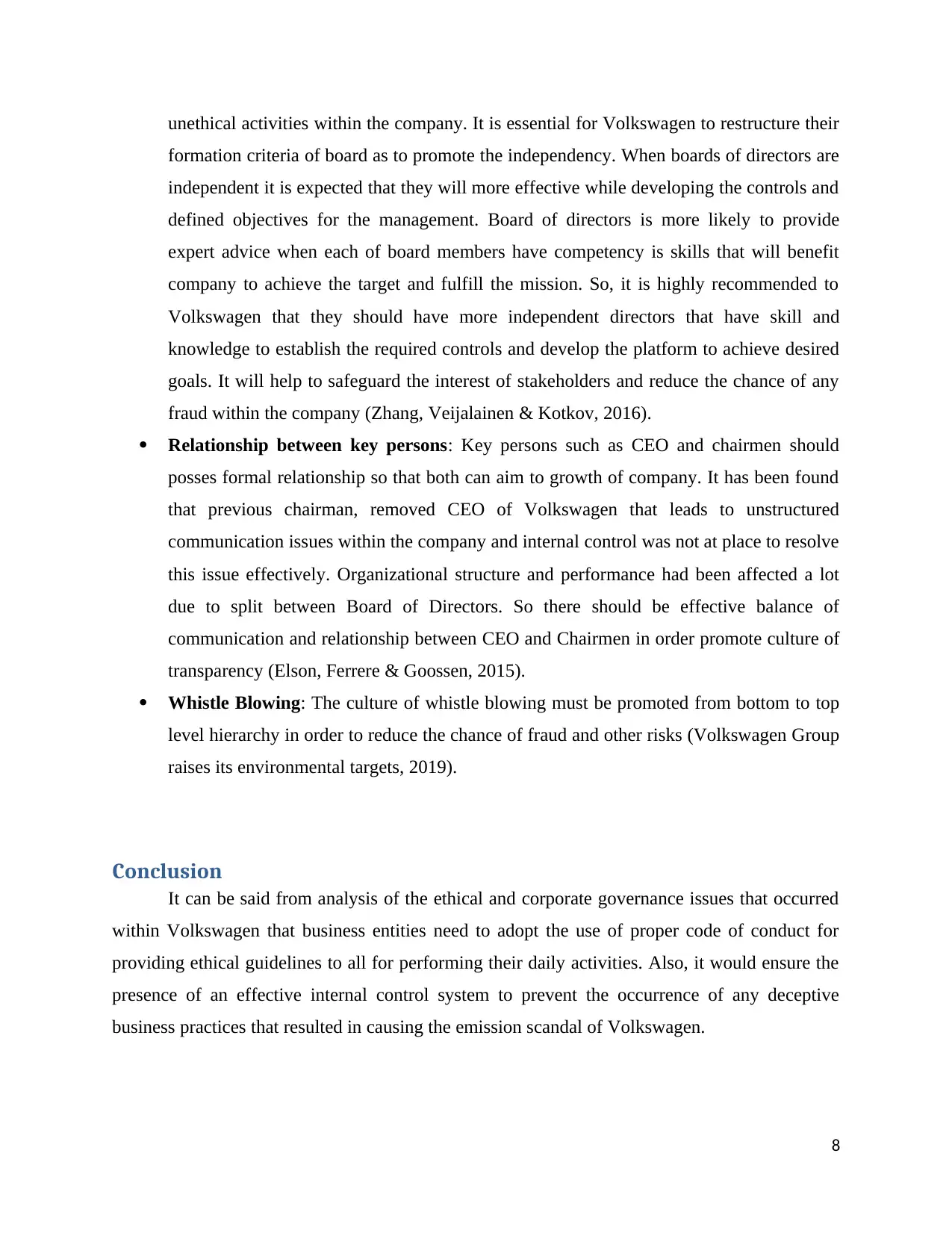
unethical activities within the company. It is essential for Volkswagen to restructure their
formation criteria of board as to promote the independency. When boards of directors are
independent it is expected that they will more effective while developing the controls and
defined objectives for the management. Board of directors is more likely to provide
expert advice when each of board members have competency is skills that will benefit
company to achieve the target and fulfill the mission. So, it is highly recommended to
Volkswagen that they should have more independent directors that have skill and
knowledge to establish the required controls and develop the platform to achieve desired
goals. It will help to safeguard the interest of stakeholders and reduce the chance of any
fraud within the company (Zhang, Veijalainen & Kotkov, 2016).
Relationship between key persons: Key persons such as CEO and chairmen should
posses formal relationship so that both can aim to growth of company. It has been found
that previous chairman, removed CEO of Volkswagen that leads to unstructured
communication issues within the company and internal control was not at place to resolve
this issue effectively. Organizational structure and performance had been affected a lot
due to split between Board of Directors. So there should be effective balance of
communication and relationship between CEO and Chairmen in order promote culture of
transparency (Elson, Ferrere & Goossen, 2015).
Whistle Blowing: The culture of whistle blowing must be promoted from bottom to top
level hierarchy in order to reduce the chance of fraud and other risks (Volkswagen Group
raises its environmental targets, 2019).
Conclusion
It can be said from analysis of the ethical and corporate governance issues that occurred
within Volkswagen that business entities need to adopt the use of proper code of conduct for
providing ethical guidelines to all for performing their daily activities. Also, it would ensure the
presence of an effective internal control system to prevent the occurrence of any deceptive
business practices that resulted in causing the emission scandal of Volkswagen.
8
formation criteria of board as to promote the independency. When boards of directors are
independent it is expected that they will more effective while developing the controls and
defined objectives for the management. Board of directors is more likely to provide
expert advice when each of board members have competency is skills that will benefit
company to achieve the target and fulfill the mission. So, it is highly recommended to
Volkswagen that they should have more independent directors that have skill and
knowledge to establish the required controls and develop the platform to achieve desired
goals. It will help to safeguard the interest of stakeholders and reduce the chance of any
fraud within the company (Zhang, Veijalainen & Kotkov, 2016).
Relationship between key persons: Key persons such as CEO and chairmen should
posses formal relationship so that both can aim to growth of company. It has been found
that previous chairman, removed CEO of Volkswagen that leads to unstructured
communication issues within the company and internal control was not at place to resolve
this issue effectively. Organizational structure and performance had been affected a lot
due to split between Board of Directors. So there should be effective balance of
communication and relationship between CEO and Chairmen in order promote culture of
transparency (Elson, Ferrere & Goossen, 2015).
Whistle Blowing: The culture of whistle blowing must be promoted from bottom to top
level hierarchy in order to reduce the chance of fraud and other risks (Volkswagen Group
raises its environmental targets, 2019).
Conclusion
It can be said from analysis of the ethical and corporate governance issues that occurred
within Volkswagen that business entities need to adopt the use of proper code of conduct for
providing ethical guidelines to all for performing their daily activities. Also, it would ensure the
presence of an effective internal control system to prevent the occurrence of any deceptive
business practices that resulted in causing the emission scandal of Volkswagen.
8
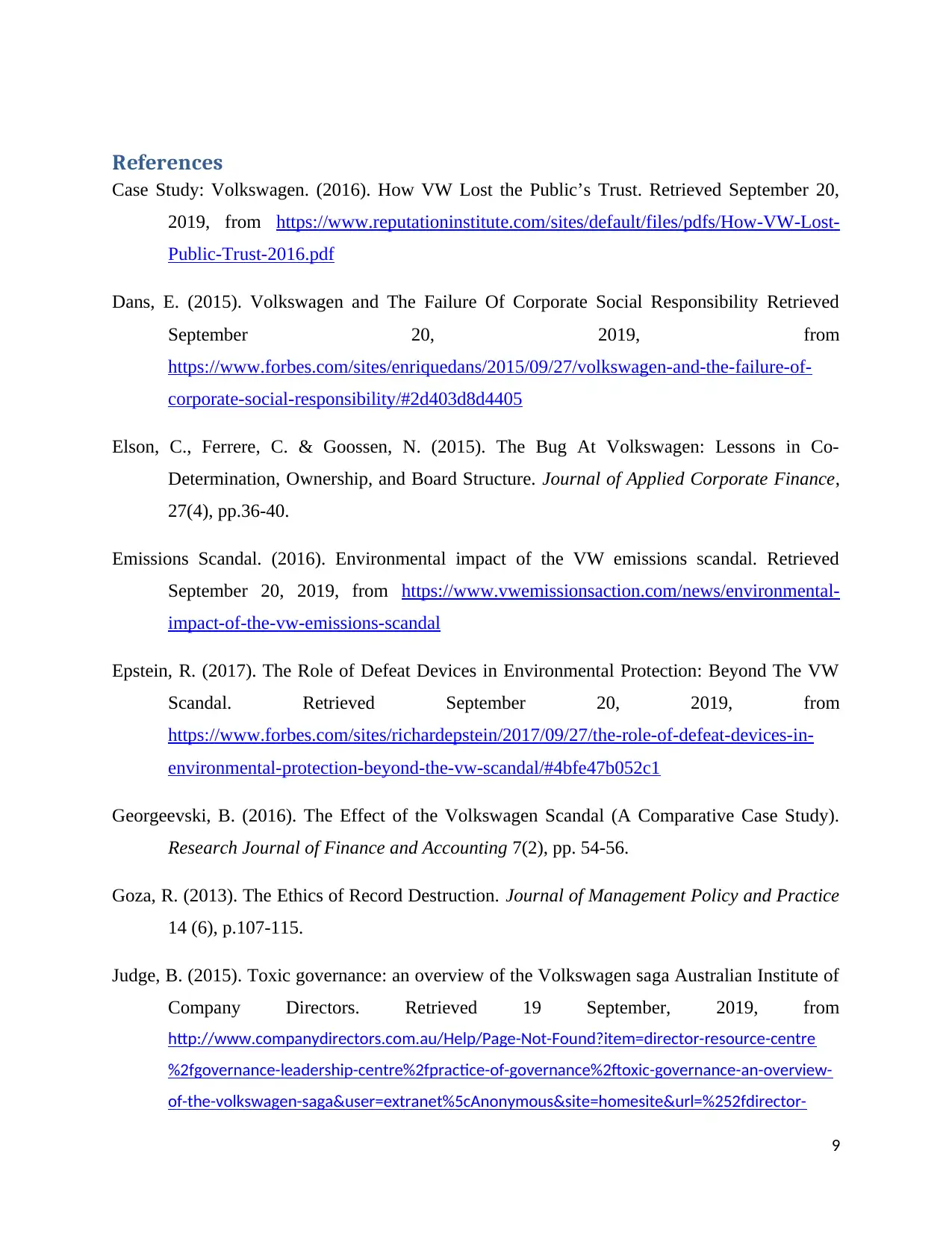
References
Case Study: Volkswagen. (2016). How VW Lost the Public’s Trust. Retrieved September 20,
2019, from https://www.reputationinstitute.com/sites/default/files/pdfs/How-VW-Lost-
Public-Trust-2016.pdf
Dans, E. (2015). Volkswagen and The Failure Of Corporate Social Responsibility Retrieved
September 20, 2019, from
https://www.forbes.com/sites/enriquedans/2015/09/27/volkswagen-and-the-failure-of-
corporate-social-responsibility/#2d403d8d4405
Elson, C., Ferrere, C. & Goossen, N. (2015). The Bug At Volkswagen: Lessons in Co-
Determination, Ownership, and Board Structure. Journal of Applied Corporate Finance,
27(4), pp.36-40.
Emissions Scandal. (2016). Environmental impact of the VW emissions scandal. Retrieved
September 20, 2019, from https://www.vwemissionsaction.com/news/environmental-
impact-of-the-vw-emissions-scandal
Epstein, R. (2017). The Role of Defeat Devices in Environmental Protection: Beyond The VW
Scandal. Retrieved September 20, 2019, from
https://www.forbes.com/sites/richardepstein/2017/09/27/the-role-of-defeat-devices-in-
environmental-protection-beyond-the-vw-scandal/#4bfe47b052c1
Georgeevski, B. (2016). The Effect of the Volkswagen Scandal (A Comparative Case Study).
Research Journal of Finance and Accounting 7(2), pp. 54-56.
Goza, R. (2013). The Ethics of Record Destruction. Journal of Management Policy and Practice
14 (6), p.107-115.
Judge, B. (2015). Toxic governance: an overview of the Volkswagen saga Australian Institute of
Company Directors. Retrieved 19 September, 2019, from
http://www.companydirectors.com.au/Help/Page-Not-Found?item=director-resource-centre
%2fgovernance-leadership-centre%2fpractice-of-governance%2ftoxic-governance-an-overview-
of-the-volkswagen-saga&user=extranet%5cAnonymous&site=homesite&url=%252fdirector-
9
Case Study: Volkswagen. (2016). How VW Lost the Public’s Trust. Retrieved September 20,
2019, from https://www.reputationinstitute.com/sites/default/files/pdfs/How-VW-Lost-
Public-Trust-2016.pdf
Dans, E. (2015). Volkswagen and The Failure Of Corporate Social Responsibility Retrieved
September 20, 2019, from
https://www.forbes.com/sites/enriquedans/2015/09/27/volkswagen-and-the-failure-of-
corporate-social-responsibility/#2d403d8d4405
Elson, C., Ferrere, C. & Goossen, N. (2015). The Bug At Volkswagen: Lessons in Co-
Determination, Ownership, and Board Structure. Journal of Applied Corporate Finance,
27(4), pp.36-40.
Emissions Scandal. (2016). Environmental impact of the VW emissions scandal. Retrieved
September 20, 2019, from https://www.vwemissionsaction.com/news/environmental-
impact-of-the-vw-emissions-scandal
Epstein, R. (2017). The Role of Defeat Devices in Environmental Protection: Beyond The VW
Scandal. Retrieved September 20, 2019, from
https://www.forbes.com/sites/richardepstein/2017/09/27/the-role-of-defeat-devices-in-
environmental-protection-beyond-the-vw-scandal/#4bfe47b052c1
Georgeevski, B. (2016). The Effect of the Volkswagen Scandal (A Comparative Case Study).
Research Journal of Finance and Accounting 7(2), pp. 54-56.
Goza, R. (2013). The Ethics of Record Destruction. Journal of Management Policy and Practice
14 (6), p.107-115.
Judge, B. (2015). Toxic governance: an overview of the Volkswagen saga Australian Institute of
Company Directors. Retrieved 19 September, 2019, from
http://www.companydirectors.com.au/Help/Page-Not-Found?item=director-resource-centre
%2fgovernance-leadership-centre%2fpractice-of-governance%2ftoxic-governance-an-overview-
of-the-volkswagen-saga&user=extranet%5cAnonymous&site=homesite&url=%252fdirector-
9
⊘ This is a preview!⊘
Do you want full access?
Subscribe today to unlock all pages.

Trusted by 1+ million students worldwide
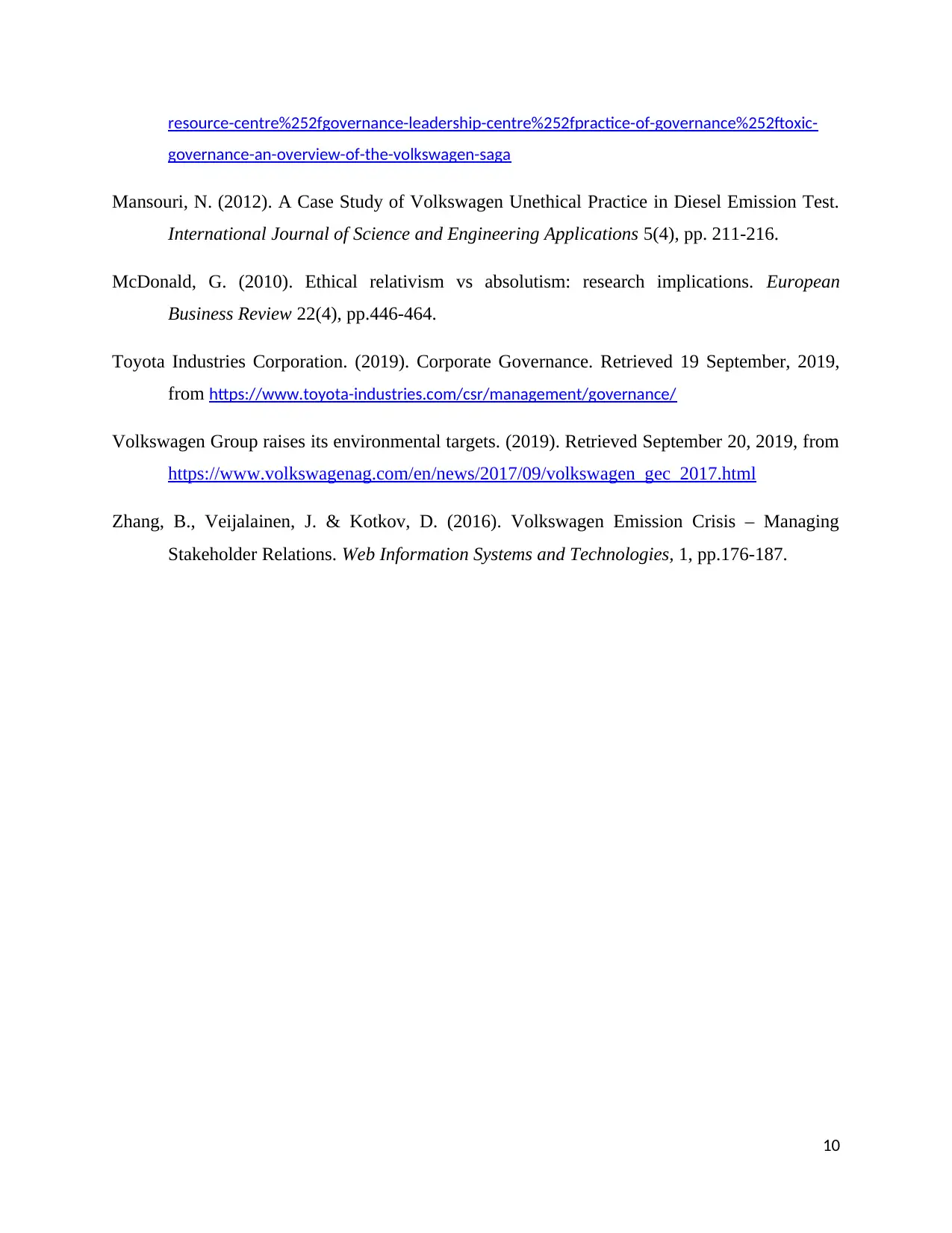
resource-centre%252fgovernance-leadership-centre%252fpractice-of-governance%252ftoxic-
governance-an-overview-of-the-volkswagen-saga
Mansouri, N. (2012). A Case Study of Volkswagen Unethical Practice in Diesel Emission Test.
International Journal of Science and Engineering Applications 5(4), pp. 211-216.
McDonald, G. (2010). Ethical relativism vs absolutism: research implications. European
Business Review 22(4), pp.446-464.
Toyota Industries Corporation. (2019). Corporate Governance. Retrieved 19 September, 2019,
from https://www.toyota-industries.com/csr/management/governance/
Volkswagen Group raises its environmental targets. (2019). Retrieved September 20, 2019, from
https://www.volkswagenag.com/en/news/2017/09/volkswagen_gec_2017.html
Zhang, B., Veijalainen, J. & Kotkov, D. (2016). Volkswagen Emission Crisis – Managing
Stakeholder Relations. Web Information Systems and Technologies, 1, pp.176-187.
10
governance-an-overview-of-the-volkswagen-saga
Mansouri, N. (2012). A Case Study of Volkswagen Unethical Practice in Diesel Emission Test.
International Journal of Science and Engineering Applications 5(4), pp. 211-216.
McDonald, G. (2010). Ethical relativism vs absolutism: research implications. European
Business Review 22(4), pp.446-464.
Toyota Industries Corporation. (2019). Corporate Governance. Retrieved 19 September, 2019,
from https://www.toyota-industries.com/csr/management/governance/
Volkswagen Group raises its environmental targets. (2019). Retrieved September 20, 2019, from
https://www.volkswagenag.com/en/news/2017/09/volkswagen_gec_2017.html
Zhang, B., Veijalainen, J. & Kotkov, D. (2016). Volkswagen Emission Crisis – Managing
Stakeholder Relations. Web Information Systems and Technologies, 1, pp.176-187.
10
1 out of 10
Related Documents
Your All-in-One AI-Powered Toolkit for Academic Success.
+13062052269
info@desklib.com
Available 24*7 on WhatsApp / Email
![[object Object]](/_next/static/media/star-bottom.7253800d.svg)
Unlock your academic potential
Copyright © 2020–2026 A2Z Services. All Rights Reserved. Developed and managed by ZUCOL.





